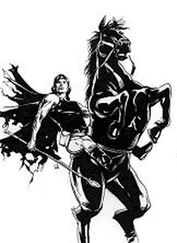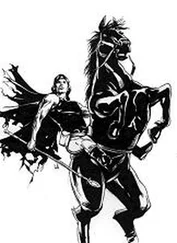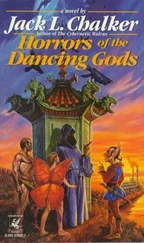Jack Chalker - Priam's Lens
Здесь есть возможность читать онлайн «Jack Chalker - Priam's Lens» весь текст электронной книги совершенно бесплатно (целиком полную версию без сокращений). В некоторых случаях можно слушать аудио, скачать через торрент в формате fb2 и присутствует краткое содержание. Год выпуска: 1999, ISBN: 1999, Издательство: Del Rey / Ballantine, Жанр: Фантастика и фэнтези, на английском языке. Описание произведения, (предисловие) а так же отзывы посетителей доступны на портале библиотеки ЛибКат.
- Название:Priam's Lens
- Автор:
- Издательство:Del Rey / Ballantine
- Жанр:
- Год:1999
- ISBN:0-345-40294-4
- Рейтинг книги:3 / 5. Голосов: 1
-
Избранное:Добавить в избранное
- Отзывы:
-
Ваша оценка:
- 60
- 1
- 2
- 3
- 4
- 5
Priam's Lens: краткое содержание, описание и аннотация
Предлагаем к чтению аннотацию, описание, краткое содержание или предисловие (зависит от того, что написал сам автор книги «Priam's Lens»). Если вы не нашли необходимую информацию о книге — напишите в комментариях, мы постараемся отыскать её.
Priam's Lens — читать онлайн бесплатно полную книгу (весь текст) целиком
Ниже представлен текст книги, разбитый по страницам. Система сохранения места последней прочитанной страницы, позволяет с удобством читать онлайн бесплатно книгу «Priam's Lens», без необходимости каждый раз заново искать на чём Вы остановились. Поставьте закладку, и сможете в любой момент перейти на страницу, на которой закончили чтение.
Интервал:
Закладка:
Max turned and tapped a code into the small console just beneath the bar. This started the synthesizer working, and within seconds a whiskey glass formed and molded itself into solidity within the cavity in back of the bar; then a soft brown liquid and a clear one poured into the glass. As soon as it was done, Max grabbed it and put it on the bar in front of the priest. “Watch the roaches, Father,” he warned. “They drink almost anything in the joint these days.”
“They’re all God’s creatures, my boy,” he responded and sipped the drink, obviously finding it to his liking.
“You know, there are nicer bars just outside the gates here,” Max told him. “Restaurants, too, some with real fresh food, not synthetics.”
“I’ll take that under advisement,” the priest replied, now drinking rather than sipping. The glass was soon empty.
“Another?”
“Just one more, exactly like that last one,” the priest responded. As Max tapped in the code, the priest continued, “You know, I’m used to everybody telling me what company I should keep and what places I’d like. It’s a misunderstanding of my whole profession, you see, although, God knows, enough hypocrites and scoundrels have browbeaten people into playing holier-than-thou for generations. Christ not only drank wine, He supplied it to others, and He spent a good deal of His time with sinners and publicans and spoke mostly about the horrid sins of religious hypocrisy. Saint Paul was betrayed by religious types but saved by a prostitute. You could almost read the Bible and find more prostitutes and thieves and the like going to heaven and more and more white-robed prayer-mongers going to hell and decide that things were all upside down.” He drank down the second drink in two quick gulps, getting a wondrously rapturous smile on his face from doing so, then reached into his jacket and pulled out a fat cigar. He clipped off the end, then lit it with a lighter that looked more like a portable blowtorch.
“You know,” said the priest, “I really like living in this time, for all its failings. There was a time when these things would just cause all sorts of horrible problems if you smoked them regularly. Now we can cure anything they can give you. It’s always been thus. Either people have been trying to rid us of all the simple pleasures because they’re bad for us, or the simple pleasures have been trying to get rid of us.”
The bartender chuckled. “You staying long or just passing through?” he asked.
“Passing through. Truth to tell, I’m in your rather, er, colorful joint for a purpose. I’m looking for someone who is said to be here.”
“I know most of the regulars. What’s the name?”
“I don’t know, really. He calls himself the Dutchman, I believe, after some impossibly ancient legend from old Earth.”
In the Bachelor Officer’s Quarters three kilometers northwest of the bar, an alarm sounded, loud enough to wake anybody but the dead.
Gene Harker stirred himself and punched the comm link. “Yeah?”
“Got a shot from Max at the Cuch,” a voice told him. “Somebody else just asked for the Dutchman.”
“I knew it!” Harker almost shouted, suddenly very wide awake.
THREE
Helena at Dawn
Littlefeet ran like the wind through the tall grass toward the day’s camp. They still called themselves a family but they were really a tribe, a group of families that moved from day to day, week to week, month to month, never in one place, never allowing themselves to be discovered or captured or worse. They traveled light, almost with nothing at all, and they traveled aimlessly, lest a pattern be noticed and betray them.
They were also quite young, incredibly so. The lifestyle gave no easy out for the weak, the aged and infirm. Although Helena was a relatively recent conquest and remake for the Titans, it still had been close to fifty years. There was no one in the tribe older than mid-thirties; the average age was much younger.
The lifestyle had evolved rapidly among survivors. Those who didn’t develop it, those who didn’t or couldn’t adapt, were all gone now. The older ones had taught the young right from the start, of course, but even after a single generation things had gotten quite muddy and confused. What counted was survival, both of the tribe and of the individual. Nothing else mattered.
Littlefeet was fifteen, although he didn’t know it and had no way of counting it, let alone any interest in why anybody would think the information was important. Like the others of the Karas family, he was naked and quite comfortable with it, and he had long, shoulder-length black hair that was kept trimmed by the Mothers using the sharp tools they carried with them. It did not do to have hair so long that it would get in the way or perhaps cause you to get stuck on something. The men’s beards had the same limitations, but most of them still wore facial hair that was quite prominent.
If a sociologist or cultural anthropologist had been able to study the family, and the countless others that also roamed Helena, from the time the Titans had come until now, they would have been amazed at the speed at which ultramodern civilized human beings had lapsed back not just to their primitive forebears’ state but beyond, almost back to the time of the smart ape. Unlike those apes, though, they still had speech and at least a verbal tradition of what had been lost now so long ago.
Littlefeet was typical for a boy his age; he was by tribal standards an adult, and all adult males were hunter-gatherers when they were not protectors, be they warriors or guards. Modern weapons had long ago been discarded; you needed ammunition and places to get it, or power and the means to recharge, to use them for very long. As with other boys his age, he had fashioned his own spear, ax, and knife, the heads or points or blades sharpened by many patient hours of work out of rock and minerals and bound to the hand-carved wood with a cement made from various muds and then with dried and toughened vines. The ax and knife were held by loops in a thin vine belt; the spear was always carried.
Ironically, the Titan system of remaking the worlds they took over also made the survival of at least some of the populations possible, even if on this primitive a scale. The temperature was always quite warm but well within tolerable limits for humans, and there were no longer any major seasonal variations. Where once great cities had risen and networks of transportation and communication had spread, there were now grasslands and rainforests.
This was pretty much consistent no matter where the Titans settled, with necessary variations for physical reasons. This was the kind of landscape they preferred, and it was the one they strove to get.
The pattern never really varied. A Titan ship, looking strangely like a glowing egg, perhaps two kilometers long and a third as wide, would come in and orbit a planet, whose planetary defenses it would either ignore or, if they were irritating enough, simply disable with a flash of energy. After it had orbited a world so that it could map every bit of the surface, it would begin its process by bathing the entire planet in an energy plasma that simply sucked up any artificial energy sources on the world. How it did this nobody knew; scientists had been able to duplicate its behavior on a small scale but there was no way to know if it was the same method the Titans used.
Once all sources of energy other than nature were removed, civilization simply ceased. Humanity had gone too long and come too far; it was too specialized to know how to handle a preindustrial economy. Nobody was left who could plow fields and sow grain and fruit and raise animals in the old ways. That knowledge had simply been lost because it was no longer needed. Robots and quasi-organic computers did that kind of thing using vast data-bases of material. Without power, they could not work or even access information, nor could their masters. Riots and starvation always followed, although this appeared meaningless to the Titans. Just as they took no notice of attempts to contact or in any way interact with them, other than to flick off irritants as a man might brush off a biting fly, they proceeded to drastically alter the planetary ecosystems. The big ship would spawn smaller ships almost like an amoeba reproducing by fission; the smaller ships, which would position themselves at key areas, appeared to have sufficient power that, together, they could literally cause a change in axial tilts, reapportion air and water so that the weather was what they wished, and then sow and plant right over the surviving people, cities, artifacts of any kind.
Читать дальшеИнтервал:
Закладка:
Похожие книги на «Priam's Lens»
Представляем Вашему вниманию похожие книги на «Priam's Lens» списком для выбора. Мы отобрали схожую по названию и смыслу литературу в надежде предоставить читателям больше вариантов отыскать новые, интересные, ещё непрочитанные произведения.
Обсуждение, отзывы о книге «Priam's Lens» и просто собственные мнения читателей. Оставьте ваши комментарии, напишите, что Вы думаете о произведении, его смысле или главных героях. Укажите что конкретно понравилось, а что нет, и почему Вы так считаете.












